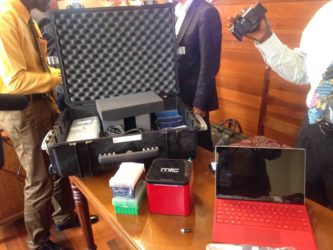The Woodlands Hospital is moving to revolutionize Guyana’s capabilities in the area of infectious disease testing, specifically with regard to the Zika virus, with the introduction of high-performance and cost-effective molecular diagnostic testing equipment.
The hospital’s new cutting-edge Zika testing equipment was presented to members of the media yesterday by a team representing Co-Diagnostics, a US based medical diagnostics company.
This follows the hospital’s decision to move away from the use of rapid testing in the light of research, which it said has shown that many devices used for rapid testing have yielded false-positive results.
Speaking at yesterday’s presentation, Chief Executive Officer (CEO) of Co-Diagnostics Dwight Egan described the particular method of testing as one that would revolutionize the way the hospital does Zika testing, as well as “the way molecular diagnostics and testing for infectious diseases are done in Guyana.”
It is understood that the use of molecular diagnostics testing detects specific sequences in DNA or Ribonucleic Acid (RNA) that may or may not be associated with specific diseases.

This, would allow for the differentiation between Zika and other viruses that share similar DNA and RNA sequences and would aid medical practitioners in making accurate diagnosis of infectious diseases.
He went on to say that this is particularly important for pregnant women as well as those who are considering pregnancy since Zika is known to be associated with the development of foetuses with Microcephaly.
“The problem with getting Zika is not that you die from it, you don’t really die from it, but a baby can be born with Microcephaly… The CDC in the United States has estimated that the cost to take care of a Zika baby is between one and ten million dollars per baby,” Egan said.
The introduction of the molecular diagnostic method of testing, Egan stated, enhances the hospital’s ability to carry out sophisticated lab tests like Zika that would have otherwise been sent abroad for testing.
“This is the kind of goal that we have for you, we want to make it so you become independent as a hospital, as a country in providing these kinds of tests for your patients,” the CEO said.
It was further stated that the decision to partner with Woodlands came as a result of the facility, particularly the lab, being described as “premier hospital here in Guyana.”
Egan expressed the hope of being able to contribute to the advancement of the hospital’s medical infrastructure in the world of molecular diagnostics.
But apart from being able to detect and differentiate among various viruses, molecular diagnostics could be used to identify areas in which mosquitoes carrying the Zika virus are breeding.
“With this kind of test, you can set up containers in different areas and collect mosquitoes, grind them up and test their DNA, the testing of their DNA could determine the areas that have Zika. And as you go through the five levels of health sector here in Guyana, they can determine at what level they can use this type of test to determine where the Zika is breeding,” the CEO explained.
Meanwhile, Managing Director of the Woodlands Hospital Dr Neville Gobin expressed gratitude to the team for selecting his hospital to extend its services while announcing that the testing will be begin immediately.
“It’s thrilling to see this group of people who came from the States to bring us this technology; As an obstetrician, Zika is of particular interest to me because many women who become pregnant are very afraid since Zika can have a negative effect on the foetus,” Dr Gobin said.
Elaborating on the hospital’s decision to move away from the use of rapid testing kits, Dr Gobin said, “There is a rapid testing kit that was previously used but we realized it was not very accurate in diagnosing Zika.’
However, he pointed that the introduction of the molecular diagnostics method of testing benefits not only the patients, but Guyana as a whole.
Alluding to Egan’s comments about the risk Zika presents to pregnant women and those considering pregnancy, Dr Gobin revealed that just recently, he was asked to terminate a pregnancy after informing a woman that her baby would possibly be born with microcephaly.
The woman, he said, had no previous history of having exhibited signs or symptoms of the Zika virus. However, he believes that had the new testing equipment been in place prior to then, the hospital could have made an earlier diagnosis.
Commenting on local cost for the test, Dr Gobin stated that it would not exceed $10,000, while Egan stated that at present, Co-Diagnostics has been able to have its equipment be used to conduct tests for as little as US$10 as opposed to other companies that produce tests that are administered at a cost of US$500 or more.
The equipment presented to the Woodlands Hospital is valued between US$7,500 – US$9,000 and is not only equipped to detect Zika and other similar viruses, but also HIV, other sexually transmitted diseases and Hepatitis B and C.
Additionally, it allows for a total of 48 samples both blood and saliva to be tested at one time while results are determined within 45 minutes.
When asked about plans to partner with other health institutions in Guyana, Egan stated that the company’s focus at this point of time is implementing the programme at the Woodlands Hospital.
However, he is keeping an open mind when he and his team meet Minister of Public Health Dr George Norton.
This meeting was expected to have occurred yesterday afternoon.




